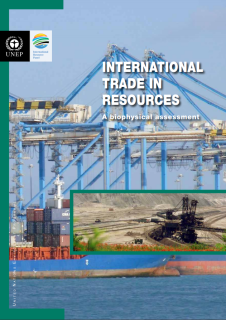
This report is an exploration of the role of international trade in increasing resource efficiency, reducing environmental impact and promoting equitable and inclusive growth. The value of international trade has increased over six-fold and its volume more than doubled between 1980 and 2010. This report examines upstream resource requirements - the materials, energy, land and water used in the country of origin for producing traded goods, but left behind as wastes and emissions. It focuses more on environmental efficiency than on economic efficiency, and explains how trade could be resource efficient by allowing commodities to be obtained from countries/locations where their production requires fewer resources and generates fewer environmental impacts than in others. However, as the publication underlines, higher trade levels, declining ore grades and decreasing energy returns upon energy investment, higher food demand and diminishing land productivity further increase the upstream resource requirements of trade, which could negate the benefits of a potentially more resource efficient allocation of extraction and production activities via world trade.
